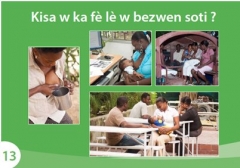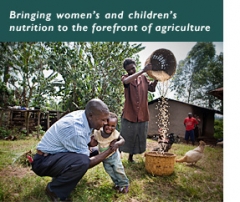New IYCN materials
Fact sheet: Achieving Nutritional Impact and Food Security through Agriculture
Nutrition and Food Security Impacts of Agriculture Projects: A Review of Experience
Nutritional Impact Assessment Tool
Haiti: Infant and young child feeding counseling cards
Nigeria: Formative assessment of infant and young child feeding practices
Zambia: Formative assessment of infant and young child feeding practices at the community level
Zambia: Recipe Book on Zambian Traditional Foods
Slide show: Engaging fathers to boost child nutrition
Video: IYCN’s Tom Schaetzel on World AIDS Day 2010
Video: Better feeding, healthy babies
Helpful links and publications
Bread for the World: 2011 Hunger Report
International Food Policy Research Institute: 2010 Global Hunger Index
News from our colleagues
PATH: New meningitis vaccine to wipe out deadly epidemics in Africa
Welcome to the eighth issue of the IYCN Update, a newsletter from USAID’s Infant & Young Child Nutrition (IYCN) Project. Distributed four times per year, each issue offers updates on the latest research, new resources, and project news.
Research highlights
Kesho Bora study results offer great promise for prevention of mother-to-child transmission of HIV during breastfeeding
Findings of the Kesho Bora study in Burkina Faso, Kenya, and South Africa are now available in the January 14, 2011, edition of Lancet Infectious Diseases. Results revealed that maternal triple antiretroviral therapy during pregnancy and breastfeeding is safe and prevents more HIV infections than short-course prophylaxis. The findings were influential in the development of the most recent World Health Organization guidelines on HIV and infant feeding. IYCN previously reported on the Kesho Bora results, released in July 2009.
Can breastfeeding reduce children’s malaria risk?
In the October 2010 issue of Journal of Acquired Immune Deficiency Syndrome, researchers examined the effect of breastfeeding on malaria risk. Among the results, they found that HIV-exposed and HIV-infected children ages 6 to 15 months were significantly less likely to get malaria when breastfed. Read more.
Potential benefits of zinc with oral rehydration solution to treat diarrhea in young infants
In an article published in the October 2010 Bulletin of the World Health Organization, researchers reported a reduction in episodes of diarrhea and acute lower respiratory infections among children younger than 6 months after receiving zinc and oral rehydration solution together with caregiver education on zinc. Their findings suggest that zinc supplementation may play an important role in reducing illness in young infants. Read more.
Improving infant diets—with and without food supplements
As reported in the August 2010 issue of Maternal and Child Nutrition, researchers in rural Zimbabwe found that mothers were more likely to practice behaviors to improve complementary feeding of their children after receiving culturally appropriate messages alone or together with a lipid-based nutrient supplement. Researchers concluded that significant improvements to infant diets can and should be made using locally available resources. Read more.
Country spotlight: Kenya
Engaging fathers to boost child nutrition
 Meet Henry, Gerishom, and other men who are supporting mothers to nourish their children in Western Kenya. Through the stories of these inspiring fathers, IYCN’s new slideshow illustrates the important role men can play in improving their children’s nutrition. View slideshow.
Meet Henry, Gerishom, and other men who are supporting mothers to nourish their children in Western Kenya. Through the stories of these inspiring fathers, IYCN’s new slideshow illustrates the important role men can play in improving their children’s nutrition. View slideshow.
Featured resource: Haiti Infant and Young Child Feeding Counseling Card

The counseling card above encourages mothers to take their babies with them or leave expressed breastmilk behind when away from home.
IYCN collaborated with the government of Haiti and partners to create a nationally validated set of Creole-language counseling cards to help health workers and community workers counsel mothers on good feeding practices. After conducting formative research, we developed key messages addressing common barriers to good nutrition, such as negative beliefs about breastfeeding in public. Pre-testing the cards with mothers and caregivers helped make sure they were effective in fostering positive change. The government will disseminate the cards to health facilities across the country in early 2011, and IYCN will facilitate training on how to use them. Download the counseling cards.
Q&A: Kenya
Integrating nutrition and HIV
In a Q&A, IYCN’s Stephanie Martin shares insights on integrating nutrition and HIV programs in Kenya. By collaborating with USAID’s AIDS, Population and Health Integrated Assistance II Western Program, led by PATH, the project incorporated infant feeding counseling and support into existing community-level HIV activities. Stephanie says the collaboration was a great opportunity to deliver integrated messages on HIV prevention while achieving efficiencies of both time and cost. Read the Q&A.
Project news
 New resources for agriculture project designers
New resources for agriculture project designers
We recently launched a set of resources to help agriculture project designers maximize nutritional benefits for women, children, and other vulnerable groups. IYCN’s Tom Schaetzel shared the new materials at the International Food Policy Research Institute’s Leveraging Agriculture for Improving Nutrition and Health Conference in New Delhi, India, February 10–12, 2011.
View the new materials:
Fact sheet: Achieving Nutritional Impact and Food Security through Agriculture
Nutrition and Food Security Impacts of Agriculture Projects: A Review of Experience
Nutritional Impact Assessment Tool
IYCN annual report recaps 2010 highlights
View a copy of our brief 2010 annual report for a summary of IYCN’s accomplishments from last year. The report includes highlights from Haiti, Kenya, Malawi, Zambia, and other countries, and updates on our global activities.
Download IYCN’s 2010 annual report.
We welcome your feedback and suggestions for our next issue. Please contact: info@iycn.org.
Photos: Aurelio Ayala III, PATH/Evelyn Hockstein
Date: Mar 20, 2011 | Category: Newsletters

